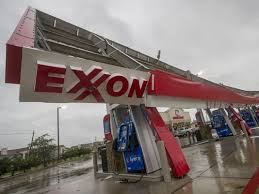Hurricane Harvey Damage Pushes Gas Prices to a Two-Year High

Gasoline prices surged to two-year highs on Monday as Tropical Storm Harvey knocked out several refineries and disrupted fuel production, while a back up in crude supplies pushed U.S. crude oil futures down more than 2.5 percent.
Massive floods caused by the storm forced several refineries to close along the U.S. Gulf Coast. Sources said the Motiva Port Arthur refinery in Texas, the country’s largest refinery, was considering shutting down as water poured into the plant. Motiva planned a final decision Tuesday morning, sources said.
“This flooding issue could be a persistent issue with the staff unable to repopulate the facilities,” said John Kilduff, partner with energy hedge fund Again Capital in New York. “Gasoline inventories could decline rapidly if we get an extended shutdown.”
Spot prices for U.S. gasoline futures surged 7% to a peak of $ 1.7799 per gallon, the highest since late July 2015, before easing to settle at $ 1.7123, up more than 3%.
Prompt U.S. gasoline differentials in the Gulf Coast hit a five-year high.
U.S. crude futures fell as the refinery shutdowns could reduce demand for American crude.
U.S. West Texas Intermediate (WTI) crude futures settled down $ 1.30 or 2.7% to 46.57. Brent crude futures were down 52 cents or around 1% at $ 51.89 per barrel.
The WTI discount versus Brent expanded to as much as $ 5.64 per barrel, its widest in two years.
Harvey, the most powerful hurricane to hit Texas in more than 50 years, killed at least two people, caused large-scale flooding and forced closure of Houston port and several refineries.
The International Energy Agency in Paris pledged to respond to major oil supply disruptions.
The U.S. National Hurricane Center said Harvey was expected to linger through Tuesday, with floods spreading from Texas eastward to Louisiana.
Texas is home to 5.6 million bpd of refining capacity, and Louisiana has 3.3 million bpd. Estimates say the storm has taken at least 2.4 million bpd of refining capacity offline.
U.S. traders were seeking oil product cargoes from North Asia, several refining and shipping sources told Reuters, with transatlantic fuel exports from Europe expected to surge.
Goldman Sachs (gs) analysts said gasoline and distillate product refining margins were likely to rise more after the storm.
“If (U.S.) refineries shut down for more than a week, Asia will need to run at a higher level, because there’s no spare capacity in Europe,” said Olivier Jakob, managing director of Petromatrix.
In Libya pipeline blockades by militia brigades have slashed the OPEC state’s output by nearly 400,000 bpd.
The market was also waiting for data on U.S. crude and refined product inventories. The American Petroleum Institute (API) releases its data on Tuesday, and the U.S. government data is due on Wednesday.


